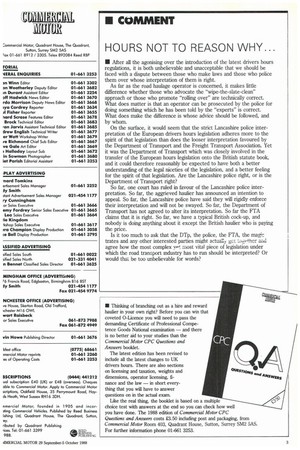HOURS NOT TO REASON WHY...
Page 3

If you've noticed an error in this article please click here to report it so we can fix it.
• After all the agonising over the introduction of the latest drivers hours regulations, it is both unbelievable and unacceptable that we should be faced with a dispute between those who make laws and those who police them over whose interpretation of them is right.
As far as the road haulage operator is concerned, it makes little difference whether those who advocate the "wipe-the-slate-clean” approach or those who promote "rolling over" are technically correct. What does matter is that an operator can be prosecuted by the police for doing something which he has been told by the "experts" is correct. What does make the difference is whose advice should be followed, and by whom.
On the surface, it would seem that the strict Lancashire police interpretation of the European drivers hours legislation adheres more to the spirit of that legislation than does the looser interpretation favoured by the Department of Transport and the Freight Transport Association. Yet it was the Department of Transport which was closely involved in the transfer of the European hours legislation onto the British statute book, and it could therefore reasonably he expected to have both a better understanding of the legal niceties of the legislation, and a better feeling for the spirit of that legislation. Are the Lancashire police right, or is the Department of Transport right?
So far, one court has ruled in favour of the Lancashire police interpretation. So far, the aggrieved haulier has announced an intention to appeal. So far, the Lancashire police have said they will rigidly enforce their interpretation and will not be swayed. So far, the Department of Transport has not agreed to alter its interpretation. So far the FTA claims that it is right. So far, we have a typical British cock-up, and nobody is doing anything about it except the British haulier who is paying the price.
Is it too much to ask that the DTp, the police, the FTA, the magi'2 trates and any other interested parties might actual:y get Lot;pi-t-ter and agree how the most complex vi-t most vital piece of legislation under which the road transport industry has to run should be interpreted? Or would that be too unbelievable for words?
















































